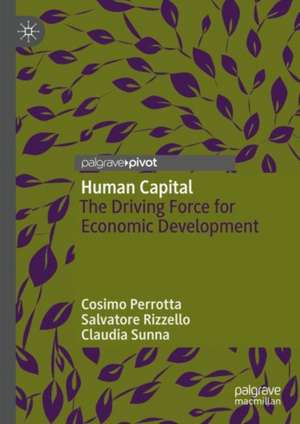Human Capital: The Driving Force for Economic Development
Autor Cosimo Perrotta, Salvatore Rizzello, Claudia Sunnaen Limba Engleză Hardback – 30 iul 2023
This book questions the relationship between profits and rent and proposes a new kind of economic development based around human capital. It will be relevant to students and researchers interested in the history of economic thought, the political economy, and labour economics.
Preț: 319.43 lei
Nou
Puncte Express: 479
Preț estimativ în valută:
61.12€ • 63.98$ • 50.87£
61.12€ • 63.98$ • 50.87£
Carte tipărită la comandă
Livrare economică 31 martie-14 aprilie
Preluare comenzi: 021 569.72.76
Specificații
ISBN-13: 9783031344930
ISBN-10: 3031344936
Ilustrații: IX, 164 p.
Dimensiuni: 148 x 210 mm
Greutate: 0.36 kg
Ediția:1st ed. 2023
Editura: Springer Nature Switzerland
Colecția Palgrave Macmillan
Locul publicării:Cham, Switzerland
ISBN-10: 3031344936
Ilustrații: IX, 164 p.
Dimensiuni: 148 x 210 mm
Greutate: 0.36 kg
Ediția:1st ed. 2023
Editura: Springer Nature Switzerland
Colecția Palgrave Macmillan
Locul publicării:Cham, Switzerland
Cuprins
1. Origins of the economy as collective activity.- 2. Custom and path-dependence. Social capital as accumulation factor.- 3. The role of the state in economic development.- 4. Competition in Enlightenment economists.- 5. On the productiveness of welfare expenditures.- 6. Keynesian Policy Today: More Employment and More Human Capital.- 7. Investing in human capital.
Notă biografică
Cosimo Perrotta is former Professor of the History of Economic Thought at the University of Salento
Salvatore Rizzello is Professor of Economics at the University of Salento.
Claudia Sunna is Associate Professor of the History of Economic Thought at the University of Salento.
Salvatore Rizzello is Professor of Economics at the University of Salento.
Claudia Sunna is Associate Professor of the History of Economic Thought at the University of Salento.
Textul de pe ultima copertă
This book presents a new interpretation of the role of human capital and the state in driving economic development. It places these ideas within broader debates within the history of economic thought to highlight how the nature of economic activity is a collective and coordinated process. Through examining how the welfare state reversed traditional accumulation by relying on human capital growth, the importance of the state within the development process is emphasised, alongside the multifaceted nature of competition. Different forms of public expenditure are then evaluated to identify the most productive forms of public spending and the drivers of long term economic development.
This book questions the relationship between profits and rent and proposes a new kind of economic development based around human capital. It will be relevant to students and researchers interested in the history of economic thought, the political economy, and labour economics.
Cosimo Perrotta is former Professor of the History of Economic Thought at the University of SalentoSalvatore Rizzello is Professor of Economics at the University of Salento.
Claudia Sunna is Associate Professor of the History of Economic Thought at the University of Salento.
Claudia Sunna is Associate Professor of the History of Economic Thought at the University of Salento.
Caracteristici
Draws ideas from defining figures within economics, such as Keynes, Hansen, Ricardo, Mill, and Marshall Updates classical ideas of human capital to relate to modern post-industrial economies Explores changing policies towards human capital from the post-War years onward
